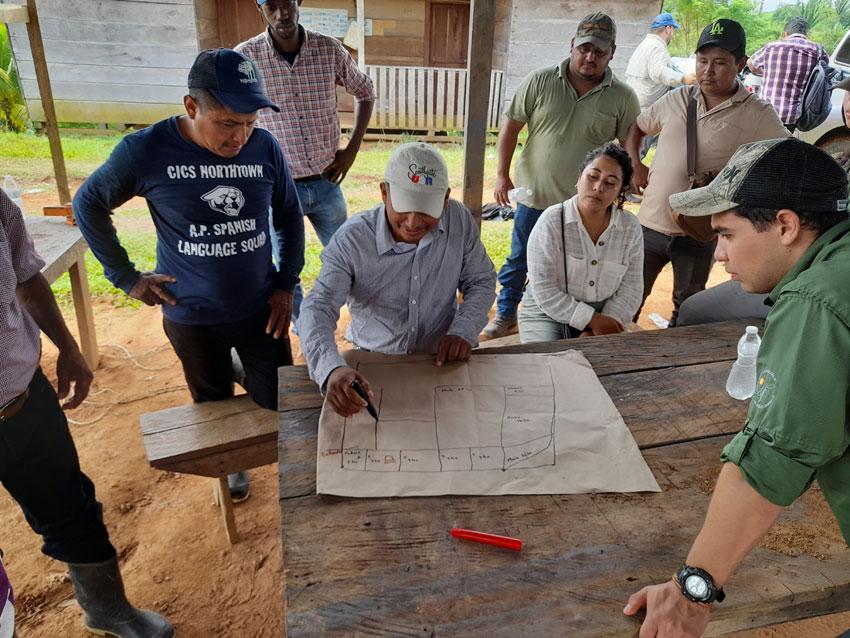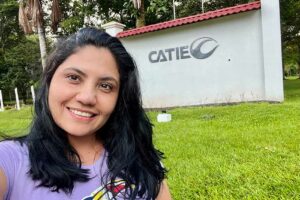Strengthening the capacities of Izabal's technical personnel to establish agroforestry and silvopastoral systems in crops

- Through knowledge management processes, field schools are implemented for productive activities in Izabal, Guatemala.
May 17, 2022. With the objective of strengthening capacities among technical personnel in the area, CATIE (Tropical Agricultural Research and Higher Education Center) and the Foundation for Ecodevelopment and Conservation (FUNDAECO,its Spanish acronym) held a joint workshop focused on rural extension processes to improve knowledge, tools, criteria and skills on how to establish, manage and improve agroforestry and silvopastoral systems with cardamom, pepper, basic grains and other crops, such as cocoa, in the Izabal region of Guatemala.
The workshop was carried out within the framework of the implementation of the Economic Development and Sustainable Territorial Governance in the Sarstún River Adjacency Zone in Guatemala project, which is executed by FUNDAECO and CATIE, with financial support from the European Union.
Among the technical personnel trained were people from FUNDAECO, the Ministry of Agriculture, Livestock and Food (MAGA, its Spanish acronym) and the Municipality of Livingston, Izabal. The workshop was given by Guillermo Detlefsen, CATIE specialist in agroforestry systems, and Cristóbal Villanueva, CATIE specialist in silvopastoral systems.
According to Carlos Moscoso, project coordinator for CATIE, this workshop continues to strengthen the skills and technical knowledge of the participants to achieve profitable and environmentally sustainable agriculture in the communities of the department of Izabal. Moscoso also indicated that the workshop covered basic criteria for agroforestry and silvopastoral systems, as well as aspects that should be considered to establish, manage or improve established systems according to the agroecological conditions in which they are located.
For Elder Perez, FUNDAECO's Sierra Caral Region coordinator and workshop participant, sharing and learning about different experiences during the workshop was very useful to enrich his knowledge related to the design, combination, management and objectives of each agroforestry and silvopastoral system, as well as the correct planning at the farm level.
He also added that these systems in the region can contribute to the generation of economic income, harvesting of products for family consumption, recovery of degraded soils, creation and/or improvement of sustainable landscapes, interconnecting areas for the creation of biological corridors and also encourage the establishment of these systems in local groups and individual owners of the communities, which is key to the conservation of protected areas.
Marlon Cruz, coordinator of the Municipal Agency of Rural Extension of MAGA (AMER, Its Spanish acronym), mentioned that the workshop was a great contribution to their activities as extensionists: "We were able to reinforce a lot of knowledge about agroforestry systems since we are making efforts to promote their establishment in the productive units of farmers who are part of our groups of Learning Center for Rural Development (CADER, its Spanish acronym In addition, he commented that it is vitally important that agroforestry and silvopastoral systems are established in the Municipality of Livingston in all cultivable areas because they improve productivity in a sustainable way.
The objective of the project, under which the workshop was carried out, is to contribute to the reduction of conflicts in the Sarstun River adjacent zone between Guatemala and Belize, as a result of the sustainable management of natural resources, the generation of economic benefits for the communities and the construction of dialogue and social participation processes.
More information/written by:
Carlos Moscoso
Project Coordinator
Economic development and sustainable territorial governance in the river adjacency zone Sarstún in Guatemala
CATIE



